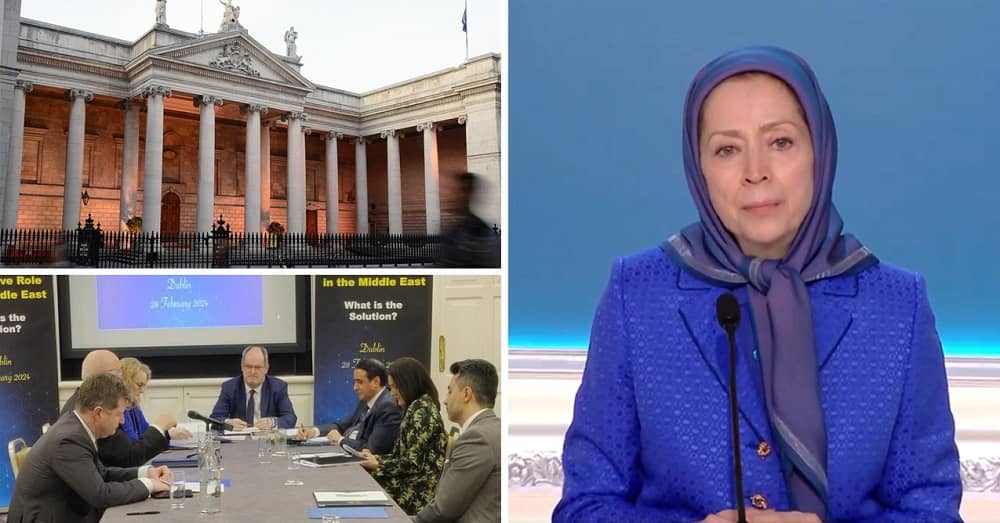
On the 28th of February, 2024, delegates from the National Council of Resistance of Iran (NCRI) engaged in discussions with members of both chambers of the Irish Parliament in Dublin.
Mrs. Maryam Rajavi the President-elect of the NCRI conveyed gratitude to Irish senators and parliamentarians via a video message, acknowledging their support for the Iranian people and solidarity with the resistance movement.
Mrs. Rajavi in her message said: “The Iranian society is in an explosive state. The mullahs are worried that every spark will cause a massive explosion. The situation has deteriorated since a year ago.
By resorting to terrorism and hostage taking, the regime has taken hostage the policy of the West. It is acting against the interests of the Iranian people and global peace and stability. Now is the time for the international community to stop appeasing the regime and start a new policy.”
Message to a meeting at the Irish Senate
The Iranian society is in an explosive state. The mullahs are worried that every spark will cause a massive explosion. The situation has deteriorated since a year ago.
By resorting to #terrorism and hostage taking, the regime has taken… pic.twitter.com/9CqFaYAvt7— Maryam Rajavi (@Maryam_Rajavi) March 2, 2024
Notable speakers during the session included Senator Gerry Horkan, who chaired the meeting, along with Senators Erin McGreehan, Mary Fitzpatrick, Gerard Patrick Craughwell, Malcolm Byrne, and Representatives John Paul Phelan, John Lahart, James O’Connor, Padraig O’Sullivan, and Cathal Berry.
Mr. Hossein Abedini, deputy director of the NCRI Office in London, participated in the meeting, while Mr. Farzin Hashemi, deputy head of the Council’s Foreign Affairs Commission, joined remotely.
Irish lawmakers stressed the alignment of democratic aspirations of Iranians with the security and economic interests of the European Union, considering the regime as a significant threat to Europe’s future and prosperity.
They recognized that while the regime’s intervention presents an immediate foreign policy challenge, the ultimate solution lies within Iran itself, through democratic change led by organized resistance. Irish Parliament members acknowledged Iran’s escalating regional conflicts as a guise for increased executions, harassment of democratic dissenters both in Iran and Europe, and intensified domestic oppression.
They acknowledged the inevitability of change in Iran, asserting the Iranian people’s demand for freedom and a democratic alternative for their future, as outlined in Maryam Rajavi’s Ten-Point Plan, supported by a nationwide protest movement led by women and Resistance Units across Iran.
Senators and representatives called on the Irish government and the European Union to recognize the Iranian people’s right to defend themselves against the Islamic Revolutionary Guard Corps (IRGC) and other suppressive forces. Additionally, they urged Ireland to collaborate with other EU member states in designating the IRGC as a terrorist organization and prioritizing this issue on its agenda.
In his remarks, Senator Gerry Horkan highlighted the NCRI’s long-standing warnings about the regime’s threat, urging policymakers to heed their counsel. He stressed the importance of the NCRI’s democratic platform, emphasizing the Iranian people’s right to choose their leaders and advocating for a network of Resistance Units to advance their cause.
Senator Horkan urged the European Union to endorse Mrs. Rajavi’s Ten-Point Plan and support the Iranian people’s resistance against the regime. He also called for targeted sanctions against regime leaders and the designation of the IRGC as a terrorist organization.
Senator Erin McGreehan shared her experience attending a women’s conference in Paris, emphasizing the stark contrast between the vibrant atmosphere of the conference and the grim realities faced by Iranian women and their families. She condemned the regime as a “terrorist regime” and urged Western democracies to reassess their trade relations with Iran, considering the human cost borne by women and dissenters.
Senator Malcolm Byrne highlighted Iran’s support for groups like Hamas, the Houthis, and Hezbollah, emphasizing Ireland’s role in advocating for dialogue in multilateral institutions like the EU and the UN.
Senator Mary Fitzpatrick expressed admiration for the bravery of those fighting for human rights in Iran, pledging unwavering support for their cause and highlighting Ireland’s commitment to democracy and equality.
Senator Gerard Craughwell recounted his experiences in Iran, highlighting the regime’s opaque tactics and coercion methods. He stressed the need for transparency and accountability in diplomatic engagements with Iran.
Mr. John Paul Phelan emphasized the need for greater recognition of the Iranian regime’s destabilizing role, urging governments to acknowledge the severity of the situation and support the Iranian people’s aspirations for a democratic republic.
Pádraig O’Sullivan expressed solidarity with Iranian exiles and called for international support for their quest for freedom and democracy. He urged scrutiny of individuals within the regime accused of corruption and human rights abuses.
Farzin Hashemi highlighted the regime’s human rights violations and condemned its campaign of intimidation against dissidents. He criticized the EU’s policy of appeasement and called for global solidarity in support of the Iranian people’s aspirations for freedom.
Human rights activist Amir Seifi urged politicians to take decisive action against the regime’s violations and called for practical steps to address the ongoing issues, including sanctions against the IRGC.
In conclusion, the meeting underscored the importance of international support for the Iranian people’s struggle for freedom and democracy, with participants pledging continued advocacy and action.